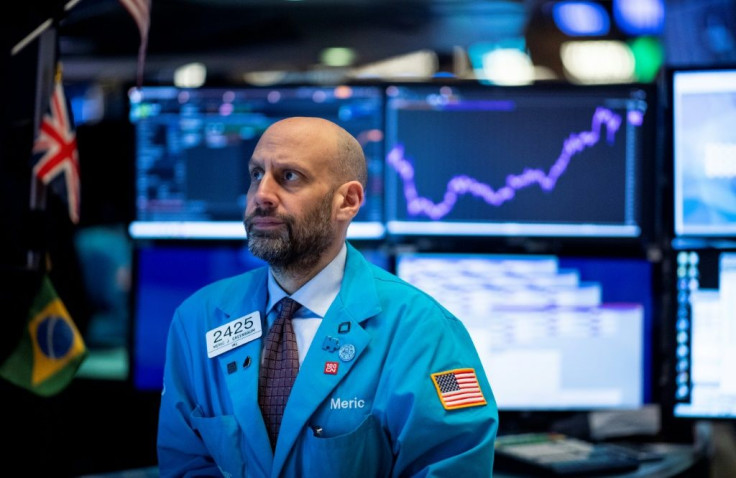Friday's Stock Market Open: US Equities Plunge As Coronavirus Outbreak Worsens, Oil At $45

KEY POINTS
- Nigeria reported its first case of coronavirus
- U.S. personal income climbed by 0.6% in January
- Through Thursday, the Dow and S&P 500 have each declined about 11%.
Update: 12:05 a.m. EDT:
U.S. stocks traded lower at noon on Friday in a wild, volatile session.
The Dow Jones Industrial Average plunged 685.83 points to 25,080.81 while the S&P 500 tumbled 62.34 points to 2,916.42 and the Nasdaq Composite Index dropped 104.33 points to 8,462.15.
In Europe markets finished broadly lower as Britain’s FTSE-100 plunged 3.38%, France’s CAC-40 plummeted 4.01% and Germany’s DAX dropped 3.86%.
National Economic Council Director Larry Kudlow urged investors to remain calm about the coronavirus and that there was no guarantee cases will “skyrocket” in the U.S.
Kudlow said “stocks looks pretty cheap to me.”
The Chicago PMI index rose to 49.0 in February from 42.9 in January. Any reading below 50 indicates worsening conditions.
The University of Michigan consumer sentiment index for February was upwardly revised to 101.0 from an initial reading of 100.9
Update: 10:35 a.m. EDT:
Friday’s huge selloff continued unabated in mid-morning trade as the Dow has swooned more than 1,000 points.
The Dow Jones Industrial Average plunged 1,028.55 points to 24,738.09 while the S&P 500 tumbled 107.79 points to 2,870.97 and the Nasdaq Composite Index dropped 249.06 points to 8,317.42
Original story:
U.S. stocks plummeted again on Friday amid continuing fears of how the widening coronavirus outbreak will damage global economic growth. Stock indexes are facing their worst weekly performance since the depths of the 2008 financial crisis.
The Dow Jones Industrial Average plunged 672.28 points to 25,094.36 while the S&P 500 tumbled 82.78 points to 2,895.98 and the Nasdaq Composite Index dropped 236.06 points to 8,330.42.
Through Thursday, the Dow and S&P 500 had each declined about 11%.
China reported 327 more cases of coronavirus, while South Korea confirmed 571 new infections.
Germany has quarantined about 1,000 people. Iran reported 143 new coronavirus infections, Nigeria, the most populous country in Africa, confirmed the first virus infection below the Sahara Desert.
St. Louis Federal Reserve President James Bullard said on Friday that interest rate cuts were possible if the virus outbreak becomes a global pandemic. But he cautioned that the pandemic scenario "was not the baseline case at this time."
Former Federal Reserve Governor Kevin Warsh said he expected the Federal and other central banks to act in tandem to respond to the coronavirus outbreak
“This thing’s moving pretty darn quickly,” he said. “At the very least, a statement on Sunday night before Asian markets open would buy them a little time and let us all learn a little bit more about where things are.”
Analysts were grim about what the virus will do to financial markets.
"Previously the market had taken some comfort in the falling infection rates in China as a result of containment measures put in place earlier,” said Mayank Mishra, a strategist at Standard Chartered Bank. "But the spread of the coronavirus infection outside China, with clusters emerging in South Korea, Italy and Japan, has increased concerns significantly."
“People have been so preconditioned to buy the dip and to always expect the market to recover that people can get smacked around with moves like this,” said Patrick Hennessy, head trader at IPS Strategic Capital. “No one knows how this thing ends.
Doug Ramsey, chief investment officer at The Leuthold Group, said “the timing of this [virus outbreak] was just the worst with respect to investor sentiment being elevated. I’m not sure that the market has really priced in the potential economic impact of this.”
The Commerce Department said on Friday that U.S. personal income climbed by 0.6% in January, above expectations, after edging up a downwardly revised 0.1% in December.
Personal spending rose by 0.2% in January, lower than expected, after advancing an upwardly revised 0.4% in December.
Overnight in Asia, markets plunged. China’s Shanghai Composite tumbled 3.71%, while Hong Kong’s Hang Seng dropped 2.42%, and Japan’s Nikkei-225 fell 3.67%.
In Europe markets traded broadly lower as Britain’s FTSE-100 plunged 4.06%, France’s CAC-40 plummeted 4.01% and Germany’s DAX dropped 4.69%.
Crude oil futures plunged 4.16% at $45.13 per barrel and Brent crude fell 3.25% at $50.5. Gold futures slipped 1.08%.
The euro fell 0.33% at $1.0965 while the pound sterling slipped 0.4% at $1.2836.
© Copyright IBTimes 2025. All rights reserved.





















